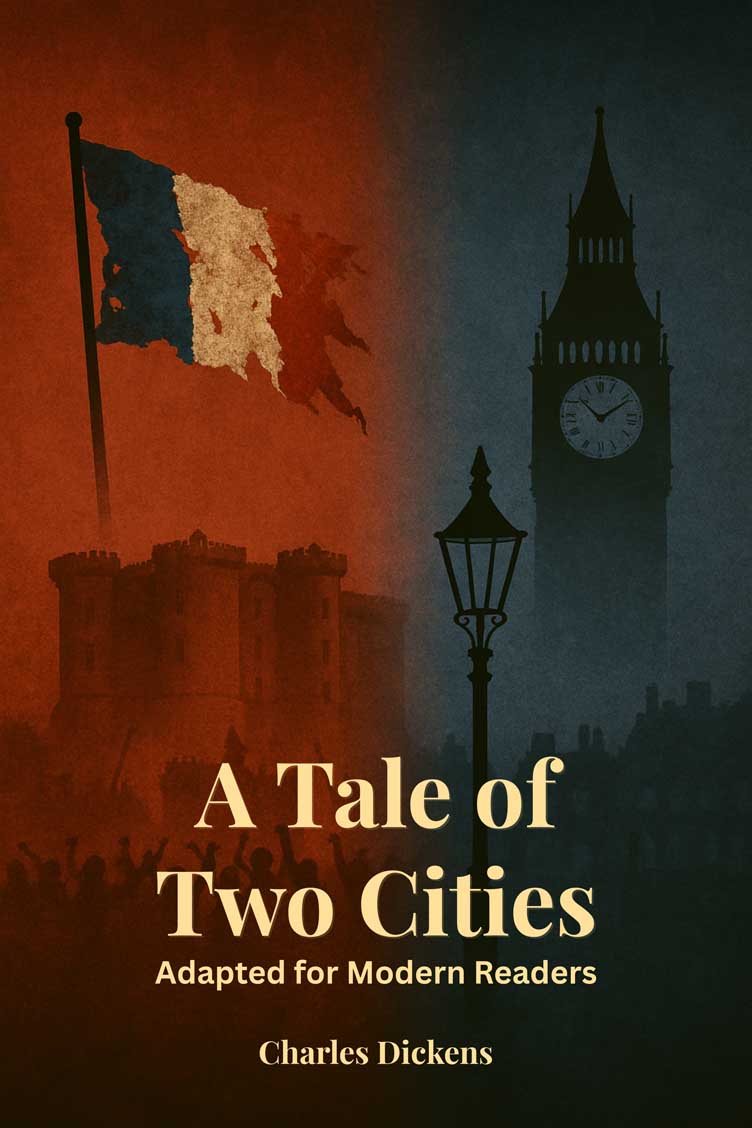Back to Classic Adaptations Purchase on Amazon
Purchase on Amazon

A Tale of Two Cities
Adapted for Modern Readers
Classic Adaptation
4.0
THIS EDITION of "A Tale of Two Cities" preserves Charles Dickens's powerful and dramatic original story while thoughtfully adapting the text for today's readers. Carefully crafted annotations clarify old-fashioned language, historical references, and challenging vocabulary, making the novel accessible and enjoyable for contemporary audiences. Perfect for leisure reading, book clubs, classroom study, or family discussions, this adaptation ensures that readers of all ages can fully appreciate Dickens's timeless masterpiece.
Set against the turbulent backdrop of the French Revolution, "A Tale of Two Cities" is a profound exploration of love, courage, and sacrifice. Follow unforgettable characters whose intertwined lives bridge the tumultuous worlds of London and revolutionary Paris, revealing how ordinary people find extraordinary strength amid chaos. Rich with compelling drama and enduring messages of compassion and redemption, this novel continues to resonate powerfully with modern readers.
Sample Comparison
Original
It was the Dover road that lay, on a Friday night late in November, before the first of the persons with whom this history has business. The Dover road lay, as to him, beyond the Dover mail, as it lumbered up Shooter's Hill. He walked up hill in the mire by the side of the mail, as the rest of the passengers did; not because they had the least relish for walking exercise, under the circumstances, but because the hill, and the harness, and the mud, and the mail, were all so heavy, that the horses had three times already come to a stop, besides once drawing the coach across the road, with the mutinous intent of taking it back to Blackheath. Reins and whip and coachman and guard, however, in combination, had read that article of war which forbade a purpose otherwise strongly in favour of the argument, that some brute animals are endued with Reason; and the team had capitulated and returned to their duty.
Adapted
It was the Dover road that lay ahead on a late Friday night in November, for the first person involved in this story. The Dover road stretched out beyond the Dover mail coach as it slowly climbed Shooter's Hill. He walked up the hill in the mud next to the mail coach, just like the other passengers did - not because they enjoyed the exercise, but because the hill, the harness, the mud, and the mail coach were all so heavy that the horses had already stopped three times. Once, they even tried to turn the coach around and head back to Blackheath. However, the reins, whip, coachman, and guard together reminded the horses of the rules, which stopped them from acting on the idea that some animals might actually have Reason. So, the team gave in and continued their job.
About the Author

Charles Dickens
Charles Dickens was an English novelist, social critic, and philanthropist born on February 7, 1812, in Portsmouth, England. He is celebrated for his rich storytelling and unforgettable characters in novels such as "A Christmas Carol," "Oliver Twist," "David Copperfield," "Great Expectations," and "A Tale of Two Cities." Dickens' works often highlighted social issues and the plight of the poor, capturing the essence of Victorian society with both humor and keen observation. His enduring legacy continues to influence literature and inspire readers around the world.